UNIT 8 LITERATURE Part 3 LESSON 2 POETRY分层练习(含解析)
文档属性
| 名称 | UNIT 8 LITERATURE Part 3 LESSON 2 POETRY分层练习(含解析) |
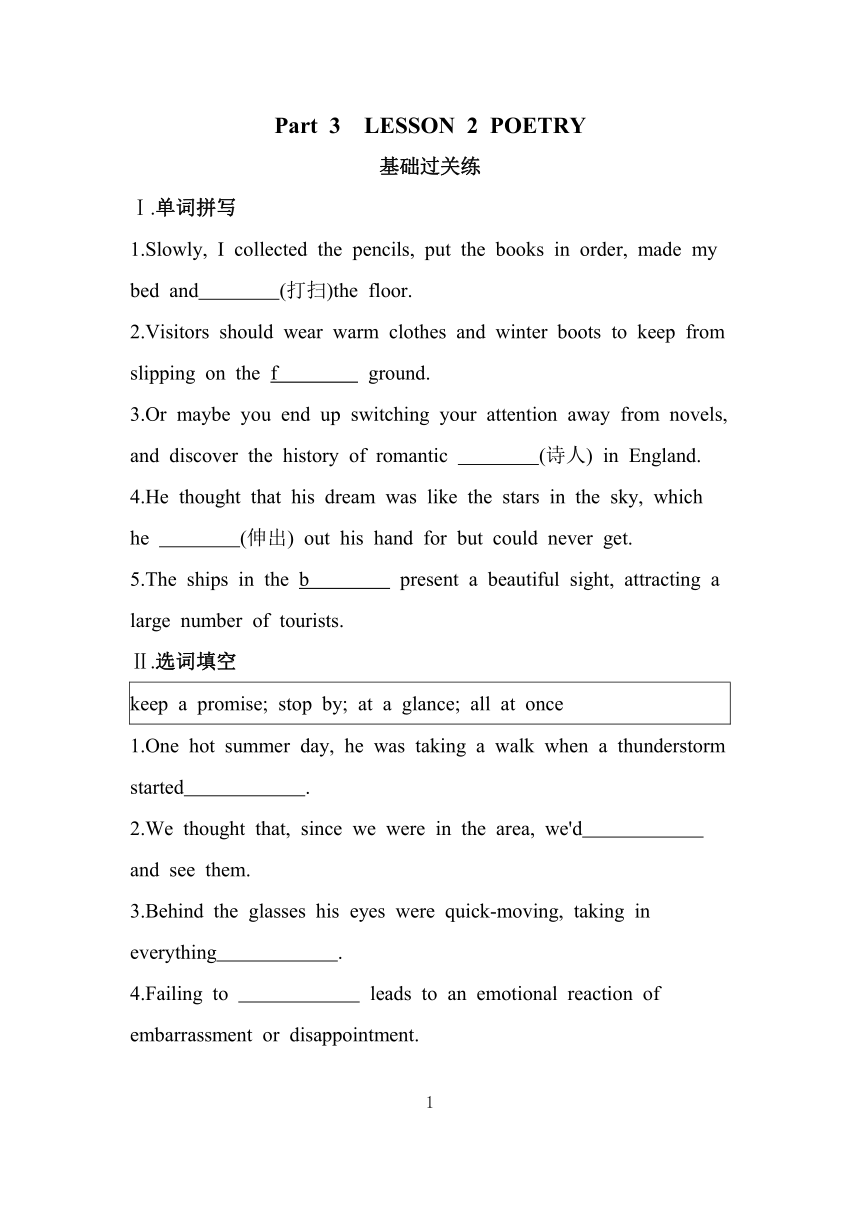
|
|
| 格式 | docx | ||
| 文件大小 | 41.0KB | ||
| 资源类型 | 试卷 | ||
| 版本资源 | 北师大版(2019) | ||
| 科目 | 英语 | ||
| 更新时间 | 2025-12-04 17:23:54 | ||
图片预览

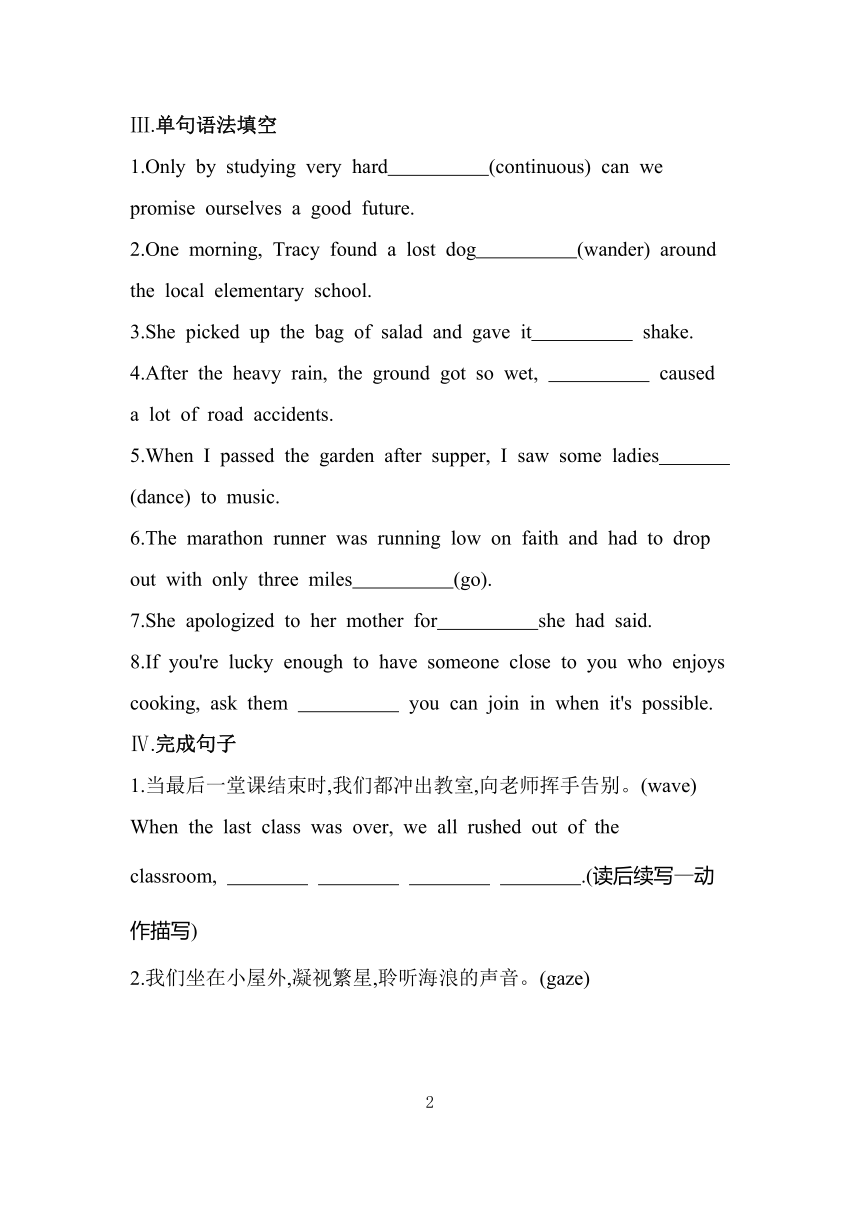
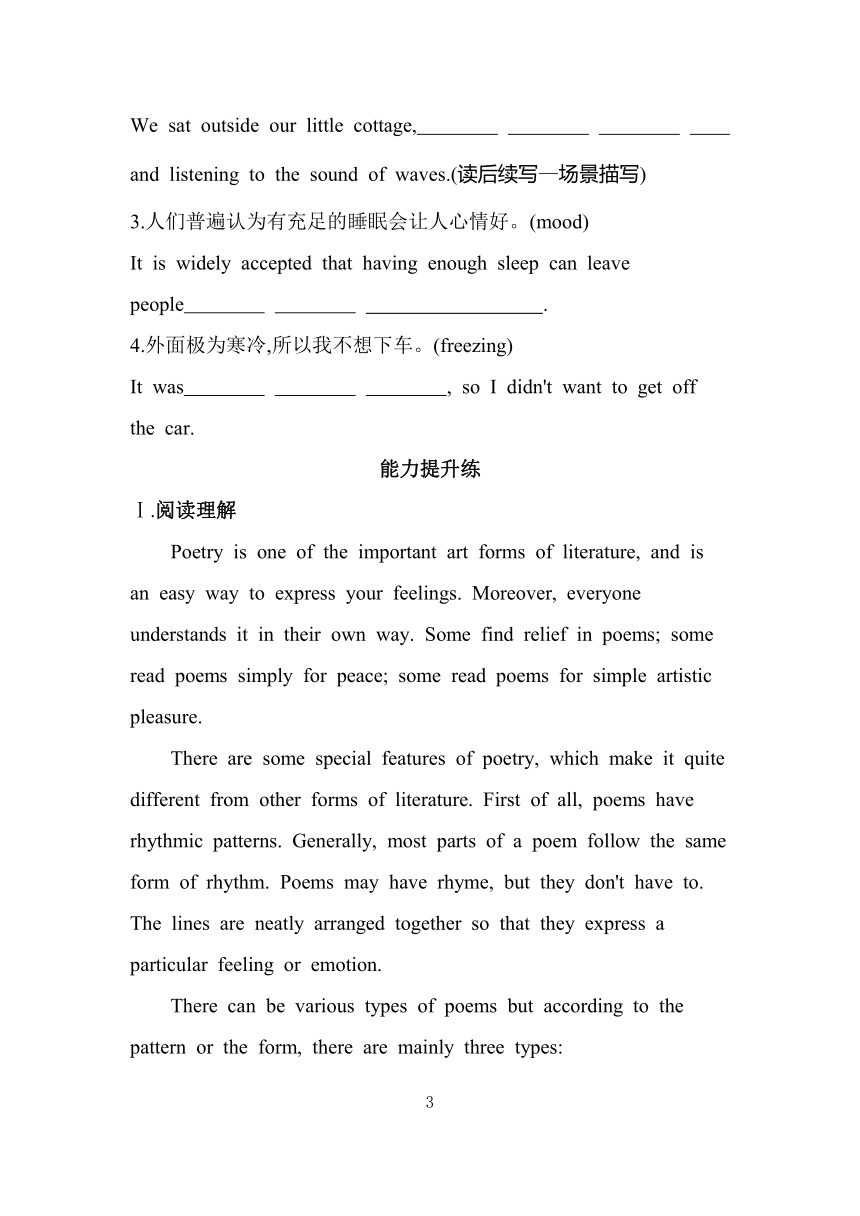
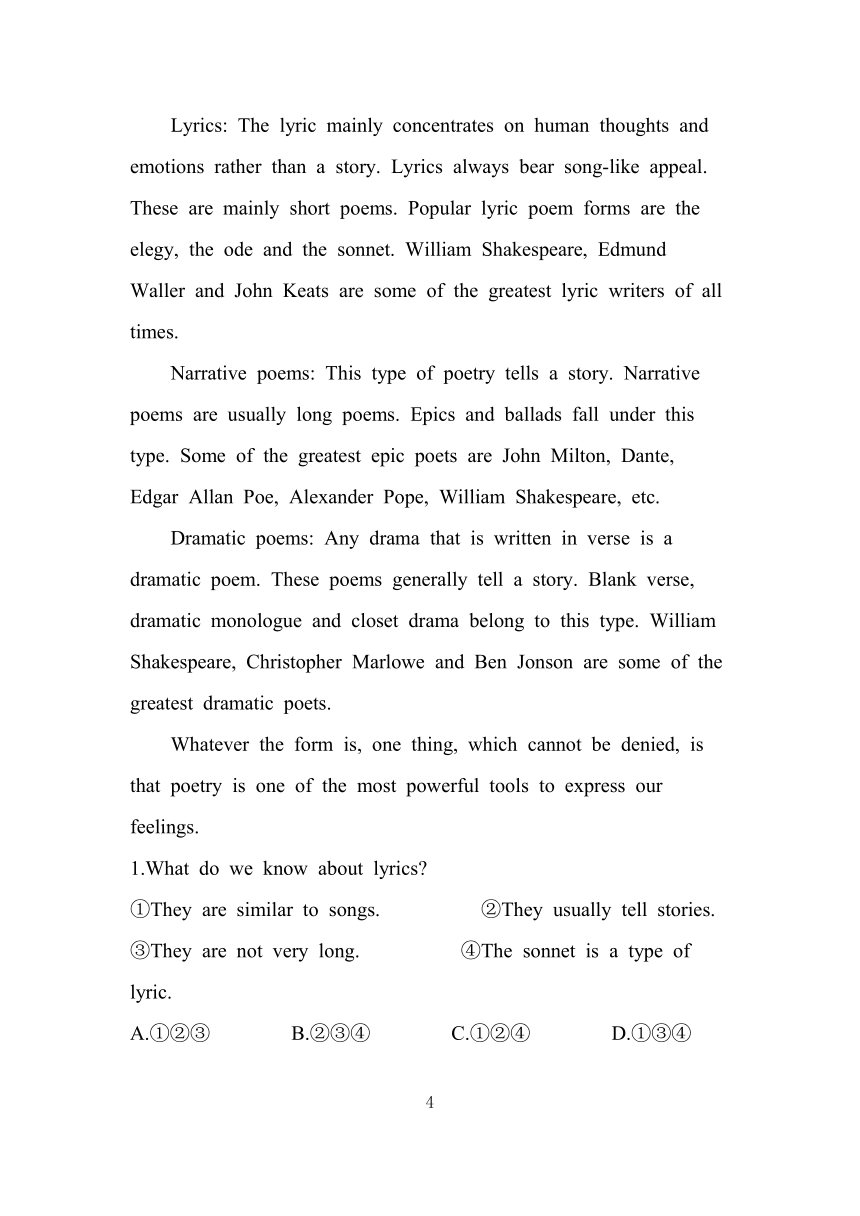
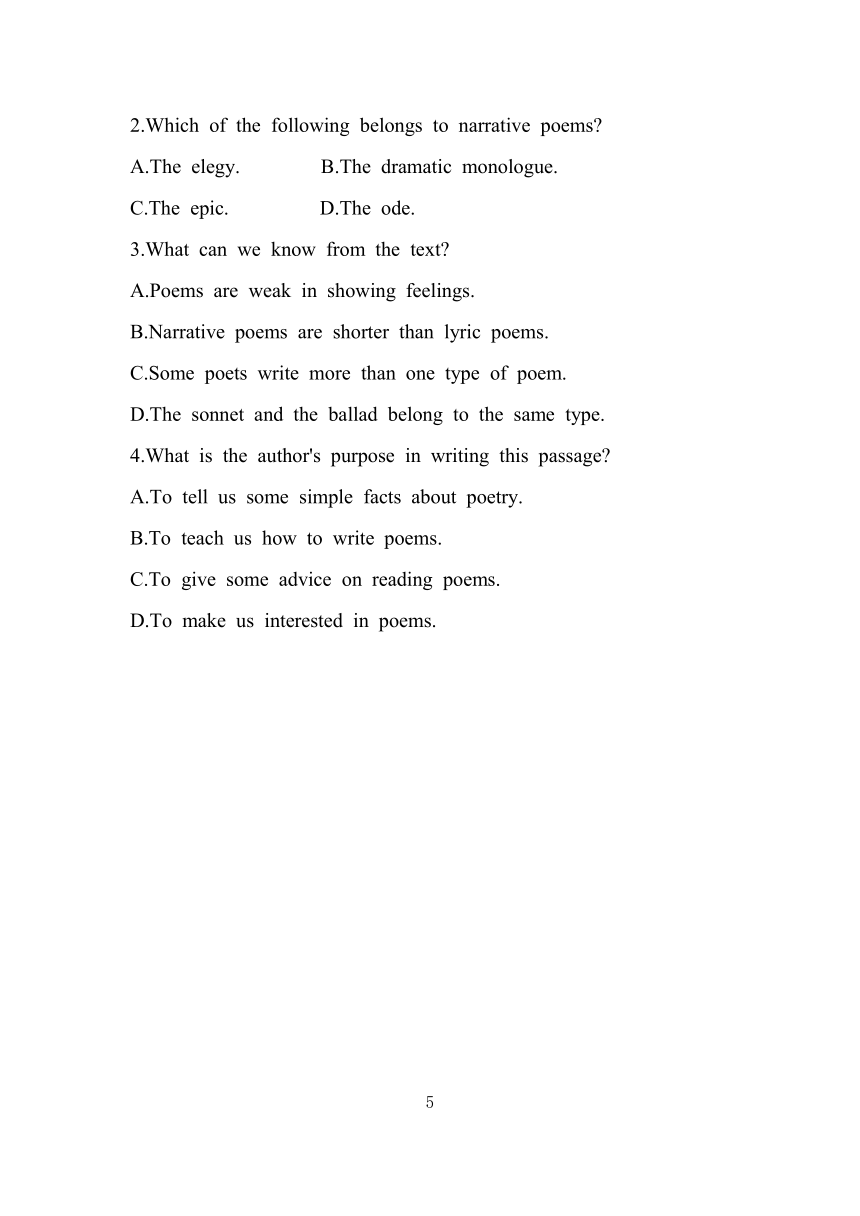
文档简介
Part 3 LESSON 2 POETRY
基础过关练
Ⅰ.单词拼写
1.Slowly, I collected the pencils, put the books in order, made my bed and (打扫)the floor.
2.Visitors should wear warm clothes and winter boots to keep from slipping on the f ground.
3.Or maybe you end up switching your attention away from novels, and discover the history of romantic (诗人) in England.
4.He thought that his dream was like the stars in the sky, which he (伸出) out his hand for but could never get.
5.The ships in the b present a beautiful sight, attracting a large number of tourists.
Ⅱ.选词填空
keep a promise; stop by; at a glance; all at once
1.One hot summer day, he was taking a walk when a thunderstorm started .
2.We thought that, since we were in the area, we'd and see them.
3.Behind the glasses his eyes were quick-moving, taking in everything .
4.Failing to leads to an emotional reaction of embarrassment or disappointment.
Ⅲ.单句语法填空
1.Only by studying very hard (continuous) can we promise ourselves a good future.
2.One morning, Tracy found a lost dog (wander) around the local elementary school.
3.She picked up the bag of salad and gave it shake.
4.After the heavy rain, the ground got so wet, caused a lot of road accidents.
5.When I passed the garden after supper, I saw some ladies (dance) to music.
6.The marathon runner was running low on faith and had to drop out with only three miles (go).
7.She apologized to her mother for she had said.
8.If you're lucky enough to have someone close to you who enjoys cooking, ask them you can join in when it's possible.
Ⅳ.完成句子
1.当最后一堂课结束时,我们都冲出教室,向老师挥手告别。(wave)
When the last class was over, we all rushed out of the classroom, .(读后续写—动作描写)
2.我们坐在小屋外,凝视繁星,聆听海浪的声音。(gaze)
We sat outside our little cottage, and listening to the sound of waves.(读后续写—场景描写)
3.人们普遍认为有充足的睡眠会让人心情好。(mood)
It is widely accepted that having enough sleep can leave people .
4.外面极为寒冷,所以我不想下车。(freezing)
It was , so I didn't want to get off the car.
能力提升练
Ⅰ.阅读理解
Poetry is one of the important art forms of literature, and is an easy way to express your feelings. Moreover, everyone understands it in their own way. Some find relief in poems; some read poems simply for peace; some read poems for simple artistic pleasure.
There are some special features of poetry, which make it quite different from other forms of literature. First of all, poems have rhythmic patterns. Generally, most parts of a poem follow the same form of rhythm. Poems may have rhyme, but they don't have to. The lines are neatly arranged together so that they express a particular feeling or emotion.
There can be various types of poems but according to the pattern or the form, there are mainly three types:
Lyrics: The lyric mainly concentrates on human thoughts and emotions rather than a story. Lyrics always bear song-like appeal. These are mainly short poems. Popular lyric poem forms are the elegy, the ode and the sonnet. William Shakespeare, Edmund Waller and John Keats are some of the greatest lyric writers of all times.
Narrative poems: This type of poetry tells a story. Narrative poems are usually long poems. Epics and ballads fall under this type. Some of the greatest epic poets are John Milton, Dante, Edgar Allan Poe, Alexander Pope, William Shakespeare, etc.
Dramatic poems: Any drama that is written in verse is a dramatic poem. These poems generally tell a story. Blank verse, dramatic monologue and closet drama belong to this type. William Shakespeare, Christopher Marlowe and Ben Jonson are some of the greatest dramatic poets.
Whatever the form is, one thing, which cannot be denied, is that poetry is one of the most powerful tools to express our feelings.
1.What do we know about lyrics
①They are similar to songs. ②They usually tell stories.
③They are not very long. ④The sonnet is a type of lyric.
A.①②③ B.②③④ C.①②④ D.①③④
2.Which of the following belongs to narrative poems
A.The elegy. B.The dramatic monologue.
C.The epic. D.The ode.
3.What can we know from the text
A.Poems are weak in showing feelings.
B.Narrative poems are shorter than lyric poems.
C.Some poets write more than one type of poem.
D.The sonnet and the ballad belong to the same type.
4.What is the author's purpose in writing this passage
A.To tell us some simple facts about poetry.
B.To teach us how to write poems.
C.To give some advice on reading poems.
D.To make us interested in poems.
Ⅱ.七选五
Do books unite us Award-winning author and poet Kwame Alexander thinks so. 1 Millions of young people around the world have read his novels and poems.
On September 8, I spoke with Alexander at the National Book Festival. I asked about his new fiction, The Door of No Return, which is due out on September 26 for young readers. 2
Did any experiences inspire you to write The Door of No Return
3 Going there so much, tasting the food, meeting the people, wandering on the beach, and putting my feet in the ocean, I felt some type of warmth. I felt like I was connected with Ghana. I wanted to write a story that was based there. Those trips inspired me, which also made the story absorbing.
In the book, the character of Kofi is faced with an unexpected challenge. How do you think challenges can bring us together
We can't figure everything out on our own. 4 We realize that we have others around us who can support us, give us ideas and help us. That makes us a stronger family and community, and stronger, better people.
Characters in your books look and act like kids I know. Why do you think it's important to make your characters real and relatable
Kids can tell if a character is fake. If it's not real, they get turned off and they don't want to read the book. I hope kids like not only the beginnings of my books but the ends of my books. 5
A.I have been to Ghana, West Africa, 11 times.
B.Truly appreciate people spreading the word.
C.Sometimes, we need help from other people.
D.Alexander is the author of several best-selling books.
E.Here are highlights from my conversation with the author.
F.In order to do that, I need to make the characters believable.
G.The author spent much of his childhood and teenage years in Virginia.
1. 2. 3. 4. 5.
Ⅲ.完形填空
A poet is in his words
The literary works of William Shakespeare are today 1 read by young people in Britain. His young readership is 2 to those who choose to study literature at university.
3 , in British schools, it is required to study the poet, and when something is made compulsory, usually the result is 4 , resentment or both. Shakespeare, Charles Dickens, Jane Austen—for many of the young, reading their books can seem like being forced to eat 5 , especially when people are at an age when they are beginning to discover themselves and wanting to 6 their independence.
This is my experience of the classics at school. Nevertheless, when I reached my late teenage years, I had a change of heart. Like every other young person since the dawn of time, the world 7 me. I wanted answers, so I 8 books to find them.
I went on to do a PhD in 9 and have taught the subject in universities in Britain and China. I have never regretted it. There is something in literature that people want, 10 they don't read books. You see this in the 11 of TV and movie adaptations of great works, the recent film version of Jane Austen's Pride and Prejudice being a case in point. These popular adaptations may help increase people's interest in the classic.
Reading a 12 Romeo and Juliet may lead to a reading of actual Shakespeare play. If that is the case, then I welcome the trend. 13 , do not make the mistake of thinking that they are the same thing. Shakespeare is a poet and his greatness is in his 14 . Reading someone else's rewriting of his work is like peeling a banana, throwing away the fruit, and eating the skin. Take the 15 . It really is worth the effort.
1.A.often B.little C.simply D.just
2.A.limited B.opposed C.attached D.used
3.A.Thus B.So C.Still D.Even
4.A.love B.boredom C.affection D.regret
5.A.meat B.oatmeal C.crow D.medicine
6.A.recover B.claim C.fight D.struggle
7.A.confused B.shocked C.hurt D.acknowledged
8.A.appealed to B.objected to C.turned to D.stuck to
9.A.science B.history C.art D.literature
10.A.even if B.as if C.only if D.if only
11.A.similarity B.resistance C.popularity D.restriction
12.A.borrowed B.worn C.simplified D.torn
13.A.However B.Besides C.Hence D.Rather
14.A.vocabulary B.language C.character D.production
15.A.initial B.memorial C.trial D.original
Part 3 LESSON 2 POETRY
基础过关练
Ⅰ.1.swept 2.frozen 3.poets 4.stretched 5.bay
Ⅱ.1.all at once 2.stop by 3.at a glance
4.keep a promise
Ⅲ.1.continuously 考查副词。设空处修饰studying very hard,所以应该用副词形式,故填continuously。
2.wandering 考查现在分词。句意:一天早上,特蕾西发现一只走失的狗在当地的小学附近徘徊。根据结构判断设空处作谓语动词found的宾语补足语,而宾语a lost dog与wander存在逻辑上的主动关系,且表示动作正在进行,故填现在分词wandering。
3.a 考查冠词。句意:她拿起了那袋沙拉摇了摇。give sth. a shake意为“摇晃某物”,此处shake为名词。
4.which 考查定语从句。句意:大雨过后,地面变得很湿,这造成了很多交通事故。分析句子结构可知,设空处引导非限制性定语从句,先行词是前面的整个主句,在从句中作主语,应用关系代词which引导,故填which。
5.dancing 考查现在分词。句意:当我晚饭后经过花园时,我看到一些女士在随着音乐跳舞。根据句子结构判断设空处作saw的宾语补足语,而宾语ladies与dance存在逻辑上的主动关系,且表示动作正在进行,故填现在分词dancing。
6.to go 考查动词不定式。句意:这位马拉松运动员信心不足地在跑,在离终点仅三英里时,不得不退出比赛。根据句子结构判断设空处作介词with的宾语补足语,由于表达的是将来的概念,使用不定式to go,此时用主动形式表示被动意义。
7.what 考查宾语从句。句意:她为自己所说的话向她的妈妈道歉。根据句子结构判断设空处引导宾语从句,结合句意可知,此空指“……的事物”,在从句中作had said的宾语,故填what。
8.if/whether 考查宾语从句。句意:如果你足够幸运,有亲近的人喜欢烹饪,问问他们如果可能的话你是否可以加入。分析句子结构可知,ask后面接宾语从句,表示“是否”,故填if或whether。
Ⅳ.1.waving our teacher goodbye 2.gazing at the stars 3.in a good mood 4.freezing cold outside
能力提升练
Ⅰ.◎语篇解读 本文是一篇说明文。文章主要介绍了诗歌的一些特点以及诗歌的几种分类。
1.D 细节理解题。根据文章第四段“Lyrics: The lyric mainly concentrates on human thoughts and emotions rather than a story...of all times.”可知,抒情诗的特点:表达人的思想和情感,而不是一个故事;具有歌曲的感染力;诗词较短;挽诗、颂诗、十四行诗都属于抒情诗。故选D。
2.C 细节理解题。根据第五段第三句“Epics and ballads fall under this type.”可知,epics和ballads属于叙事诗。故选C。
3.C 推理判断题。第四段最后一句“William Shakespeare, Edmund Waller and John Keats are some of the greatest lyric writers of all times.”,第五段最后一句“Some of the greatest epic poets are John Milton, Dante, Edgar Allan Poe, Alexander Pope, William Shakespeare, etc.”和第六段最后一句“William Shakespeare, Christopher Marlowe and Ben Jonson are some of the greatest dramatic poets.”都提到了莎士比亚,由此可推知,有的诗人不只写一种类型的诗,如莎士比亚。故选C。
4.A 主旨大意题。通读全文可知,本文主要向我们介绍了诗歌的特点、分类等一些基本知识,所以A选项“To tell us some simple facts about poetry.”符合题意。故选A。
【高频词汇】 1.relief n.宽慰,轻松 2.feature n.特点 3.various adj.各种各样的 4.concentrate on专注于
5.belong to属于
【熟词生义】 1.line n.诗行 2.bear v.显示,带有
3.fall v.属于(某类、群体、责任范围)
长难句
原句 Whatever the form is, one thing, which cannot be denied, is that poetry is one of the most powerful tools to express our feelings.
分析 本句是主从复合句。Whatever引导让步状语从句;which引导非限制性定语从句,修饰先行词one thing;that引导表语从句。
译文 无论形式如何,有一点是不可否认的,那就是诗歌是表达我们情感的最有力的工具之一。
Ⅱ.◎语篇解读 本文是一篇访谈。作者主要记录了与获奖作家及诗人Kwame Alexander针对其小说《不归之门》会谈的主要内容。
1.D 过渡句。上文“获奖作家及诗人Kwame Alexander这样认为”提出了本文主要谈论的人物,结合下文“全世界数百万年轻人都读过他的小说和诗歌”可知,他的作品深受年轻人喜爱,故D项“Alexander is the author of several best-selling books.(Alexander是好几本畅销书的作者)”衔接上下文恰当。故选D项。
2.E 过渡句。上文提到了“我询问了关于他的新小说《不归之门》的信息,这部小说在9月26日面向年轻读者出版”,下文描述了两人对话的内容,由此可知E项“Here are highlights from my conversation with the author.(这是一些我和作者谈话的主要内容)”承上启下,衔接恰当。故选E项。
3.A 细节句。下文“去了那里许多次,品尝食物,与人们见面,在海滩上闲逛,把双脚伸进海里,我感到某种温暖。我觉得我和加纳有联系。我想写一个基于那里的故事”描述了作者在一个去过许多次的地方(加纳)的体验。A项“I have been to Ghana, West Africa, 11 times.(我去过西非的加纳十一次)”与下文衔接恰当。故选A项。
4.C 细节句。上文“我们不能自己解决所有的问题”说明了自身的局限性,下文“我们意识到我们身边有其他人可以支持我们,给我们出主意并帮助我们”说明了我们需要他人的帮助。C项“Sometimes, we need help from other people.(有时,我们需要他人的帮助)”与上下文意思一致。故选C项。
5.F 细节句。 上文“我希望孩子们不仅喜欢我的书的开头,还喜欢我的书的结局”说明了Alexander写书的愿望,F项“In order to do that, I need to make the characters believable. [为了做到这一点,我需要让(我的书中的)角色可信]”与上文衔接恰当。故选F项。
【高频词汇】 1.inspire v.激励,鼓舞 2.challenge n.挑战v.向……挑战 3.figure out解决;算出;理解
4.appreciate v.欣赏;理解 5.highlight n.最好(或最精彩、最激动人心)的部分v.突出,强调 6.conversation n.谈话
【熟词生义】 turn off使厌烦;使失去兴趣
【差距词汇】 1.due out待发 2.relatable adj.可理解的;感同身受的;引起共鸣的
长难句
原句 I asked about his new fiction, The Door of No Return, which is due out on September 26 for young readers.
分析 本句是主从复合句。The Door of No Return是his new fiction的同位语,which引导非限制性定语从句,修饰先行词his new fiction。
译文 我询问了关于他的新小说《不归之门》的信息,这部小说在9月26日面向年轻读者出版。
Ⅲ.◎语篇解读 本文是一篇议论文。作者介绍了莎士比亚的文学作品在英国的现状、自己与文学相关的经历以及自己对读莎士比亚作品的看法。
1.B 根据下文“in British schools, it is required to study the poet”和“for many of the young, reading their books can seem like being forced to eat...”可推知此处表示现在年轻人很少读莎士比亚的作品,故选B。
2.A 句意:他的年轻读者仅限于那些选择在大学学习文学的人。由上下文可知,莎士比亚的作品的读者很少。故选A。limit限制;oppose反对;attach附上;use使用。
3.C 句意:不过,在英国的学校,要求(学生)学习这位诗人,当某件事成为强制性的时候,结果通常是厌倦、怨恨或两者兼有。上文讲现在读莎士比亚的作品的人很少,由下文“in British schools, it is required to study the poet”可知,英国的学校要求学习莎士比亚,上下文有转折关系,用副词still,表示“但,不过”。故选C。
4.B 由上文可知年轻人不喜欢读莎士比亚的作品,被强迫学应该会感到厌倦。故选B。boredom厌倦;affection喜爱;regret懊悔。
5.D 句意:莎士比亚、查尔斯·狄更斯、简·奥斯汀——对许多年轻人来说,读他们的书可能就像是被迫服药,尤其是当人们正处于开始发现自我、想要获得独立的年龄段。因为强迫年轻人读书让他们感觉很不好,所以应该是像强迫他们服药。故选D。oatmeal燕麦粥;crow乌鸦。
6.B 由句中的“discover themselves”并结合常识可推断此处指要求独立,故选B。recover恢复;claim要求(拥有),宣称。
7.A 根据下文“I wanted answers”可知,作者有疑问,这个世界让他感到困惑,故选A。confuse使困惑;shock使震惊;acknowledge承认。
8.C 此处表示作者向书籍寻求答案,故选C。appeal to呼吁,吸引;object to反对;turn to求助于;stick to坚持。
9.D 句意:我继续攻读文学博士学位,并在英国和中国的大学里教授这一学科。根据上文可知作者从文学著作中寻找答案,解决自己的困惑,结合下文“have taught the subject in universities in Britain and China. I have never regretted it.”可知,他选择了攻读文学博士学位。故选D。
10.A 句意:即使人们不读书,文学中也有一些他们想要的东西。由语境可知前后文之间为让步关系, even if引导让步状语从句。故选A。even if即使;as if好像;only if只有;if only要是……多好。
11.C 句意:你可以从伟大作品改编的电视和电影的流行中看到这一点,最近的简·奥斯汀的电影版的《傲慢与偏见》就是一个很好的例子。根据下文“These popular adaptations”可知,这些改编的电视和电影都很流行。故选C。similarity相似;resistance抵制;popularity流行;restriction限制。
12.C 句意:阅读简化版的《罗密欧与朱丽叶》可能会引导(我们去)阅读真正的莎士比亚剧。根据下文“actual Shakespeare play”可知,之前读的是简化版。故选C。simplify简化;tear撕开。
13.A 句意:然而,不要错误地认为它们是同样的东西。结合上文和下文“do not make the mistake of thinking that they are the same thing”可知,尽管作者认为读简化版有好处,但也强调它们和真正的戏剧不是一回事,上下文之间有转折关系。故选A。
14.B 句意:莎士比亚是一位诗人,他的伟大之处在于他的语言。由下文作者的描述“读莎士比亚作品的简化版本或改编版本就像吃香蕉只吃皮”可知,读莎士比亚作品的简化版本无法体会他的语言。故选B。
15.D 结合上文可知,作者认为读莎士比亚作品的简化版本或改编版本就像吃香蕉只吃皮,他建议读者读原作。故选D。initial首字母;memorial纪念碑;trial审判,试验;original原作。
【高频词汇】 1.compulsory adj.强制的,必须做的
2.dawn n.开端;黎明 3.regret vt.懊悔 4.adaptation n.改编本 5.version n.版本 6.trend n.趋势;倾向
7.worth adj.值得……的
【差距词汇】 1.readership n.读者 2.resentment n.怨恨;愤恨 3.peel vt.剥皮
长难句
原句 Shakespeare, Charles Dickens, Jane Austen—for many of the young, reading their books can seem like being forced to eat medicine, especially when people are at an age when they are beginning to discover themselves and wanting to claim their independence.
分析 本句为主从复合句。主句的主语是动名词短语reading their books;句中第一个when引导时间状语从句;第二个when为关系副词,引导定语从句,修饰先行词age。
译文 莎士比亚、查尔斯·狄更斯、简·奥斯汀——对许多年轻人来说,读他们的书可能就像是被迫服药,尤其是当人们正处于开始发现自我、想要获得独立的年龄段。
10
基础过关练
Ⅰ.单词拼写
1.Slowly, I collected the pencils, put the books in order, made my bed and (打扫)the floor.
2.Visitors should wear warm clothes and winter boots to keep from slipping on the f ground.
3.Or maybe you end up switching your attention away from novels, and discover the history of romantic (诗人) in England.
4.He thought that his dream was like the stars in the sky, which he (伸出) out his hand for but could never get.
5.The ships in the b present a beautiful sight, attracting a large number of tourists.
Ⅱ.选词填空
keep a promise; stop by; at a glance; all at once
1.One hot summer day, he was taking a walk when a thunderstorm started .
2.We thought that, since we were in the area, we'd and see them.
3.Behind the glasses his eyes were quick-moving, taking in everything .
4.Failing to leads to an emotional reaction of embarrassment or disappointment.
Ⅲ.单句语法填空
1.Only by studying very hard (continuous) can we promise ourselves a good future.
2.One morning, Tracy found a lost dog (wander) around the local elementary school.
3.She picked up the bag of salad and gave it shake.
4.After the heavy rain, the ground got so wet, caused a lot of road accidents.
5.When I passed the garden after supper, I saw some ladies (dance) to music.
6.The marathon runner was running low on faith and had to drop out with only three miles (go).
7.She apologized to her mother for she had said.
8.If you're lucky enough to have someone close to you who enjoys cooking, ask them you can join in when it's possible.
Ⅳ.完成句子
1.当最后一堂课结束时,我们都冲出教室,向老师挥手告别。(wave)
When the last class was over, we all rushed out of the classroom, .(读后续写—动作描写)
2.我们坐在小屋外,凝视繁星,聆听海浪的声音。(gaze)
We sat outside our little cottage, and listening to the sound of waves.(读后续写—场景描写)
3.人们普遍认为有充足的睡眠会让人心情好。(mood)
It is widely accepted that having enough sleep can leave people .
4.外面极为寒冷,所以我不想下车。(freezing)
It was , so I didn't want to get off the car.
能力提升练
Ⅰ.阅读理解
Poetry is one of the important art forms of literature, and is an easy way to express your feelings. Moreover, everyone understands it in their own way. Some find relief in poems; some read poems simply for peace; some read poems for simple artistic pleasure.
There are some special features of poetry, which make it quite different from other forms of literature. First of all, poems have rhythmic patterns. Generally, most parts of a poem follow the same form of rhythm. Poems may have rhyme, but they don't have to. The lines are neatly arranged together so that they express a particular feeling or emotion.
There can be various types of poems but according to the pattern or the form, there are mainly three types:
Lyrics: The lyric mainly concentrates on human thoughts and emotions rather than a story. Lyrics always bear song-like appeal. These are mainly short poems. Popular lyric poem forms are the elegy, the ode and the sonnet. William Shakespeare, Edmund Waller and John Keats are some of the greatest lyric writers of all times.
Narrative poems: This type of poetry tells a story. Narrative poems are usually long poems. Epics and ballads fall under this type. Some of the greatest epic poets are John Milton, Dante, Edgar Allan Poe, Alexander Pope, William Shakespeare, etc.
Dramatic poems: Any drama that is written in verse is a dramatic poem. These poems generally tell a story. Blank verse, dramatic monologue and closet drama belong to this type. William Shakespeare, Christopher Marlowe and Ben Jonson are some of the greatest dramatic poets.
Whatever the form is, one thing, which cannot be denied, is that poetry is one of the most powerful tools to express our feelings.
1.What do we know about lyrics
①They are similar to songs. ②They usually tell stories.
③They are not very long. ④The sonnet is a type of lyric.
A.①②③ B.②③④ C.①②④ D.①③④
2.Which of the following belongs to narrative poems
A.The elegy. B.The dramatic monologue.
C.The epic. D.The ode.
3.What can we know from the text
A.Poems are weak in showing feelings.
B.Narrative poems are shorter than lyric poems.
C.Some poets write more than one type of poem.
D.The sonnet and the ballad belong to the same type.
4.What is the author's purpose in writing this passage
A.To tell us some simple facts about poetry.
B.To teach us how to write poems.
C.To give some advice on reading poems.
D.To make us interested in poems.
Ⅱ.七选五
Do books unite us Award-winning author and poet Kwame Alexander thinks so. 1 Millions of young people around the world have read his novels and poems.
On September 8, I spoke with Alexander at the National Book Festival. I asked about his new fiction, The Door of No Return, which is due out on September 26 for young readers. 2
Did any experiences inspire you to write The Door of No Return
3 Going there so much, tasting the food, meeting the people, wandering on the beach, and putting my feet in the ocean, I felt some type of warmth. I felt like I was connected with Ghana. I wanted to write a story that was based there. Those trips inspired me, which also made the story absorbing.
In the book, the character of Kofi is faced with an unexpected challenge. How do you think challenges can bring us together
We can't figure everything out on our own. 4 We realize that we have others around us who can support us, give us ideas and help us. That makes us a stronger family and community, and stronger, better people.
Characters in your books look and act like kids I know. Why do you think it's important to make your characters real and relatable
Kids can tell if a character is fake. If it's not real, they get turned off and they don't want to read the book. I hope kids like not only the beginnings of my books but the ends of my books. 5
A.I have been to Ghana, West Africa, 11 times.
B.Truly appreciate people spreading the word.
C.Sometimes, we need help from other people.
D.Alexander is the author of several best-selling books.
E.Here are highlights from my conversation with the author.
F.In order to do that, I need to make the characters believable.
G.The author spent much of his childhood and teenage years in Virginia.
1. 2. 3. 4. 5.
Ⅲ.完形填空
A poet is in his words
The literary works of William Shakespeare are today 1 read by young people in Britain. His young readership is 2 to those who choose to study literature at university.
3 , in British schools, it is required to study the poet, and when something is made compulsory, usually the result is 4 , resentment or both. Shakespeare, Charles Dickens, Jane Austen—for many of the young, reading their books can seem like being forced to eat 5 , especially when people are at an age when they are beginning to discover themselves and wanting to 6 their independence.
This is my experience of the classics at school. Nevertheless, when I reached my late teenage years, I had a change of heart. Like every other young person since the dawn of time, the world 7 me. I wanted answers, so I 8 books to find them.
I went on to do a PhD in 9 and have taught the subject in universities in Britain and China. I have never regretted it. There is something in literature that people want, 10 they don't read books. You see this in the 11 of TV and movie adaptations of great works, the recent film version of Jane Austen's Pride and Prejudice being a case in point. These popular adaptations may help increase people's interest in the classic.
Reading a 12 Romeo and Juliet may lead to a reading of actual Shakespeare play. If that is the case, then I welcome the trend. 13 , do not make the mistake of thinking that they are the same thing. Shakespeare is a poet and his greatness is in his 14 . Reading someone else's rewriting of his work is like peeling a banana, throwing away the fruit, and eating the skin. Take the 15 . It really is worth the effort.
1.A.often B.little C.simply D.just
2.A.limited B.opposed C.attached D.used
3.A.Thus B.So C.Still D.Even
4.A.love B.boredom C.affection D.regret
5.A.meat B.oatmeal C.crow D.medicine
6.A.recover B.claim C.fight D.struggle
7.A.confused B.shocked C.hurt D.acknowledged
8.A.appealed to B.objected to C.turned to D.stuck to
9.A.science B.history C.art D.literature
10.A.even if B.as if C.only if D.if only
11.A.similarity B.resistance C.popularity D.restriction
12.A.borrowed B.worn C.simplified D.torn
13.A.However B.Besides C.Hence D.Rather
14.A.vocabulary B.language C.character D.production
15.A.initial B.memorial C.trial D.original
Part 3 LESSON 2 POETRY
基础过关练
Ⅰ.1.swept 2.frozen 3.poets 4.stretched 5.bay
Ⅱ.1.all at once 2.stop by 3.at a glance
4.keep a promise
Ⅲ.1.continuously 考查副词。设空处修饰studying very hard,所以应该用副词形式,故填continuously。
2.wandering 考查现在分词。句意:一天早上,特蕾西发现一只走失的狗在当地的小学附近徘徊。根据结构判断设空处作谓语动词found的宾语补足语,而宾语a lost dog与wander存在逻辑上的主动关系,且表示动作正在进行,故填现在分词wandering。
3.a 考查冠词。句意:她拿起了那袋沙拉摇了摇。give sth. a shake意为“摇晃某物”,此处shake为名词。
4.which 考查定语从句。句意:大雨过后,地面变得很湿,这造成了很多交通事故。分析句子结构可知,设空处引导非限制性定语从句,先行词是前面的整个主句,在从句中作主语,应用关系代词which引导,故填which。
5.dancing 考查现在分词。句意:当我晚饭后经过花园时,我看到一些女士在随着音乐跳舞。根据句子结构判断设空处作saw的宾语补足语,而宾语ladies与dance存在逻辑上的主动关系,且表示动作正在进行,故填现在分词dancing。
6.to go 考查动词不定式。句意:这位马拉松运动员信心不足地在跑,在离终点仅三英里时,不得不退出比赛。根据句子结构判断设空处作介词with的宾语补足语,由于表达的是将来的概念,使用不定式to go,此时用主动形式表示被动意义。
7.what 考查宾语从句。句意:她为自己所说的话向她的妈妈道歉。根据句子结构判断设空处引导宾语从句,结合句意可知,此空指“……的事物”,在从句中作had said的宾语,故填what。
8.if/whether 考查宾语从句。句意:如果你足够幸运,有亲近的人喜欢烹饪,问问他们如果可能的话你是否可以加入。分析句子结构可知,ask后面接宾语从句,表示“是否”,故填if或whether。
Ⅳ.1.waving our teacher goodbye 2.gazing at the stars 3.in a good mood 4.freezing cold outside
能力提升练
Ⅰ.◎语篇解读 本文是一篇说明文。文章主要介绍了诗歌的一些特点以及诗歌的几种分类。
1.D 细节理解题。根据文章第四段“Lyrics: The lyric mainly concentrates on human thoughts and emotions rather than a story...of all times.”可知,抒情诗的特点:表达人的思想和情感,而不是一个故事;具有歌曲的感染力;诗词较短;挽诗、颂诗、十四行诗都属于抒情诗。故选D。
2.C 细节理解题。根据第五段第三句“Epics and ballads fall under this type.”可知,epics和ballads属于叙事诗。故选C。
3.C 推理判断题。第四段最后一句“William Shakespeare, Edmund Waller and John Keats are some of the greatest lyric writers of all times.”,第五段最后一句“Some of the greatest epic poets are John Milton, Dante, Edgar Allan Poe, Alexander Pope, William Shakespeare, etc.”和第六段最后一句“William Shakespeare, Christopher Marlowe and Ben Jonson are some of the greatest dramatic poets.”都提到了莎士比亚,由此可推知,有的诗人不只写一种类型的诗,如莎士比亚。故选C。
4.A 主旨大意题。通读全文可知,本文主要向我们介绍了诗歌的特点、分类等一些基本知识,所以A选项“To tell us some simple facts about poetry.”符合题意。故选A。
【高频词汇】 1.relief n.宽慰,轻松 2.feature n.特点 3.various adj.各种各样的 4.concentrate on专注于
5.belong to属于
【熟词生义】 1.line n.诗行 2.bear v.显示,带有
3.fall v.属于(某类、群体、责任范围)
长难句
原句 Whatever the form is, one thing, which cannot be denied, is that poetry is one of the most powerful tools to express our feelings.
分析 本句是主从复合句。Whatever引导让步状语从句;which引导非限制性定语从句,修饰先行词one thing;that引导表语从句。
译文 无论形式如何,有一点是不可否认的,那就是诗歌是表达我们情感的最有力的工具之一。
Ⅱ.◎语篇解读 本文是一篇访谈。作者主要记录了与获奖作家及诗人Kwame Alexander针对其小说《不归之门》会谈的主要内容。
1.D 过渡句。上文“获奖作家及诗人Kwame Alexander这样认为”提出了本文主要谈论的人物,结合下文“全世界数百万年轻人都读过他的小说和诗歌”可知,他的作品深受年轻人喜爱,故D项“Alexander is the author of several best-selling books.(Alexander是好几本畅销书的作者)”衔接上下文恰当。故选D项。
2.E 过渡句。上文提到了“我询问了关于他的新小说《不归之门》的信息,这部小说在9月26日面向年轻读者出版”,下文描述了两人对话的内容,由此可知E项“Here are highlights from my conversation with the author.(这是一些我和作者谈话的主要内容)”承上启下,衔接恰当。故选E项。
3.A 细节句。下文“去了那里许多次,品尝食物,与人们见面,在海滩上闲逛,把双脚伸进海里,我感到某种温暖。我觉得我和加纳有联系。我想写一个基于那里的故事”描述了作者在一个去过许多次的地方(加纳)的体验。A项“I have been to Ghana, West Africa, 11 times.(我去过西非的加纳十一次)”与下文衔接恰当。故选A项。
4.C 细节句。上文“我们不能自己解决所有的问题”说明了自身的局限性,下文“我们意识到我们身边有其他人可以支持我们,给我们出主意并帮助我们”说明了我们需要他人的帮助。C项“Sometimes, we need help from other people.(有时,我们需要他人的帮助)”与上下文意思一致。故选C项。
5.F 细节句。 上文“我希望孩子们不仅喜欢我的书的开头,还喜欢我的书的结局”说明了Alexander写书的愿望,F项“In order to do that, I need to make the characters believable. [为了做到这一点,我需要让(我的书中的)角色可信]”与上文衔接恰当。故选F项。
【高频词汇】 1.inspire v.激励,鼓舞 2.challenge n.挑战v.向……挑战 3.figure out解决;算出;理解
4.appreciate v.欣赏;理解 5.highlight n.最好(或最精彩、最激动人心)的部分v.突出,强调 6.conversation n.谈话
【熟词生义】 turn off使厌烦;使失去兴趣
【差距词汇】 1.due out待发 2.relatable adj.可理解的;感同身受的;引起共鸣的
长难句
原句 I asked about his new fiction, The Door of No Return, which is due out on September 26 for young readers.
分析 本句是主从复合句。The Door of No Return是his new fiction的同位语,which引导非限制性定语从句,修饰先行词his new fiction。
译文 我询问了关于他的新小说《不归之门》的信息,这部小说在9月26日面向年轻读者出版。
Ⅲ.◎语篇解读 本文是一篇议论文。作者介绍了莎士比亚的文学作品在英国的现状、自己与文学相关的经历以及自己对读莎士比亚作品的看法。
1.B 根据下文“in British schools, it is required to study the poet”和“for many of the young, reading their books can seem like being forced to eat...”可推知此处表示现在年轻人很少读莎士比亚的作品,故选B。
2.A 句意:他的年轻读者仅限于那些选择在大学学习文学的人。由上下文可知,莎士比亚的作品的读者很少。故选A。limit限制;oppose反对;attach附上;use使用。
3.C 句意:不过,在英国的学校,要求(学生)学习这位诗人,当某件事成为强制性的时候,结果通常是厌倦、怨恨或两者兼有。上文讲现在读莎士比亚的作品的人很少,由下文“in British schools, it is required to study the poet”可知,英国的学校要求学习莎士比亚,上下文有转折关系,用副词still,表示“但,不过”。故选C。
4.B 由上文可知年轻人不喜欢读莎士比亚的作品,被强迫学应该会感到厌倦。故选B。boredom厌倦;affection喜爱;regret懊悔。
5.D 句意:莎士比亚、查尔斯·狄更斯、简·奥斯汀——对许多年轻人来说,读他们的书可能就像是被迫服药,尤其是当人们正处于开始发现自我、想要获得独立的年龄段。因为强迫年轻人读书让他们感觉很不好,所以应该是像强迫他们服药。故选D。oatmeal燕麦粥;crow乌鸦。
6.B 由句中的“discover themselves”并结合常识可推断此处指要求独立,故选B。recover恢复;claim要求(拥有),宣称。
7.A 根据下文“I wanted answers”可知,作者有疑问,这个世界让他感到困惑,故选A。confuse使困惑;shock使震惊;acknowledge承认。
8.C 此处表示作者向书籍寻求答案,故选C。appeal to呼吁,吸引;object to反对;turn to求助于;stick to坚持。
9.D 句意:我继续攻读文学博士学位,并在英国和中国的大学里教授这一学科。根据上文可知作者从文学著作中寻找答案,解决自己的困惑,结合下文“have taught the subject in universities in Britain and China. I have never regretted it.”可知,他选择了攻读文学博士学位。故选D。
10.A 句意:即使人们不读书,文学中也有一些他们想要的东西。由语境可知前后文之间为让步关系, even if引导让步状语从句。故选A。even if即使;as if好像;only if只有;if only要是……多好。
11.C 句意:你可以从伟大作品改编的电视和电影的流行中看到这一点,最近的简·奥斯汀的电影版的《傲慢与偏见》就是一个很好的例子。根据下文“These popular adaptations”可知,这些改编的电视和电影都很流行。故选C。similarity相似;resistance抵制;popularity流行;restriction限制。
12.C 句意:阅读简化版的《罗密欧与朱丽叶》可能会引导(我们去)阅读真正的莎士比亚剧。根据下文“actual Shakespeare play”可知,之前读的是简化版。故选C。simplify简化;tear撕开。
13.A 句意:然而,不要错误地认为它们是同样的东西。结合上文和下文“do not make the mistake of thinking that they are the same thing”可知,尽管作者认为读简化版有好处,但也强调它们和真正的戏剧不是一回事,上下文之间有转折关系。故选A。
14.B 句意:莎士比亚是一位诗人,他的伟大之处在于他的语言。由下文作者的描述“读莎士比亚作品的简化版本或改编版本就像吃香蕉只吃皮”可知,读莎士比亚作品的简化版本无法体会他的语言。故选B。
15.D 结合上文可知,作者认为读莎士比亚作品的简化版本或改编版本就像吃香蕉只吃皮,他建议读者读原作。故选D。initial首字母;memorial纪念碑;trial审判,试验;original原作。
【高频词汇】 1.compulsory adj.强制的,必须做的
2.dawn n.开端;黎明 3.regret vt.懊悔 4.adaptation n.改编本 5.version n.版本 6.trend n.趋势;倾向
7.worth adj.值得……的
【差距词汇】 1.readership n.读者 2.resentment n.怨恨;愤恨 3.peel vt.剥皮
长难句
原句 Shakespeare, Charles Dickens, Jane Austen—for many of the young, reading their books can seem like being forced to eat medicine, especially when people are at an age when they are beginning to discover themselves and wanting to claim their independence.
分析 本句为主从复合句。主句的主语是动名词短语reading their books;句中第一个when引导时间状语从句;第二个when为关系副词,引导定语从句,修饰先行词age。
译文 莎士比亚、查尔斯·狄更斯、简·奥斯汀——对许多年轻人来说,读他们的书可能就像是被迫服药,尤其是当人们正处于开始发现自我、想要获得独立的年龄段。
10
